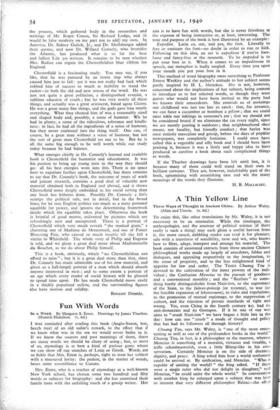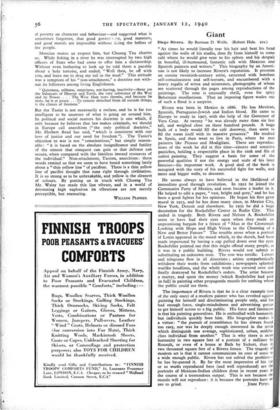A Thin Yellow Line
Three Ways of Thought in Ancient China. By Arthur Waley. (Allen and Unwin. 7s. 6c1.)
To enjoy this, like other translations by Mr. Waley, it is not necessary to be an orientalist. While the sinologue, the anthropologist, and the amateur of political science (if there really is such a thing) may each glean a useful harvest frOm it, the more casual, dabbling reader can read it for pleasure, safe with a translator of sensibility, taste and wit, who knows how to filter, adapt, interpret and arrange his material. The book consists of annotated extracts from three ancient Chinese philosophical works made up largely of anecdotes, fables and dialogues, and appealing respectively to the imagination, to the sense of propriety, and to the less enlightened kind of appetite for law and order. The Taoist Chuang Tzu is devoted to the cultivation of the inner powers of the indi- vidual ; the Confucian Mencius to the pursuit of goodness and a conventional morality ; and the " Realists " to some- thing barely distinguishable from Nazi-ism, to the supremacy of the State, to the fuhrer-prinzip (or tyranny), to war (or the forcible expansion of lebensraum), to rules and regulations, to the promotion of mutual espionage, to the suppression of culture, and the rejection of private standards of right and wrong. Yes, even China in the fourth century B.C. had its anti-democrats and its Gestapos. If it be one of our war aims to "crush Nazi-ism" we have begun a little late in the day : how can one " crush " a mode of thought and policy that has had its followers all through history?
Chuang Tzu, says Mr. Waley, is " one of the most enter- taining as well as one of the profoundest books in the world." Chuang Tzu, in fact, is a philosopher to the marrow, whereas Mencius is something of a moralist, virtuous and vexable, a trifle schoolmasterish, even a little Blimp-like in his con- servatism. Certainly Mencius is on the side of decency, dignity, and peace. A king asked him how a world settlement could be arrived at. By unification, said Mencius. " Who is capable of uniting the world? " the king asked. " If there were a single ruler who did not delight in slaughter," said Mencius, " he could unite the whole world." In conversation with another king he enlarged upon a subject that was later to interest that very different philosopher Balzac—the effect of poverty on character and behaviour—and suggested what is sometimes forgotten, that good govern r_ 2,1t, good manners,
and good morals are impossible without riding the bellies of the people.
Mencius makes us respect him, but Chuang Tzu charms
us. While fishing in a river he was interrupted by two high officers of State who had come to offer him a dictatorship.
Without even bothering to look up he told them a parable about a holy tortoise, and ended, " Well then, be off with you, and leave me to drag my tail in the mud." This attitude was a symptom of his " non-attachment," a doctrine not with- out its followers among living Englishmen.
" Quietness, stillness, emptiness, not-having, inactivity—these are the balancers of Heaven and Earth, the very substance of the Way and its Power. . . . The Wise Man rests therein, and because he rests, he is at peace. • ..To remain detached from all outside things, is the climax of fineness."
But the Taoist is not necessarily a recluse, and he is far too intelligent to be unaware of what is going on around him.
In political and social matters his doctrine is one which, if only because he believes that law makes criminals, we should in Europe call anarchism (" the only political doctrine," Mr. Herbert Read has said, " which is consistent with our love of justice and our need for freedom "). The Taoist's objection to war is not " conscientious," but simply reason- able: " it is based on the absolute insignificance and futility of the utmost that conquest can gain or that defence can secure, when compared with the limitless inward resources of the individual." Non-attachment, Taoism, anarchism: these words remind us that we seem to have heard something lately about a " thin yellow line " of pacifism. There is a thin yellow line of pacifist thought that runs right through civilisation.
It is so strong as to be unbreakable, and yellow is the cleanest of colours. By putting us in touch with Chuang Tzu Mr. Waley has made this line vibrate, and in a world of detonating high explosives its vibrations are not merely perceptible, but reassuring. WILLIAM PLOMER.



































 Previous page
Previous page